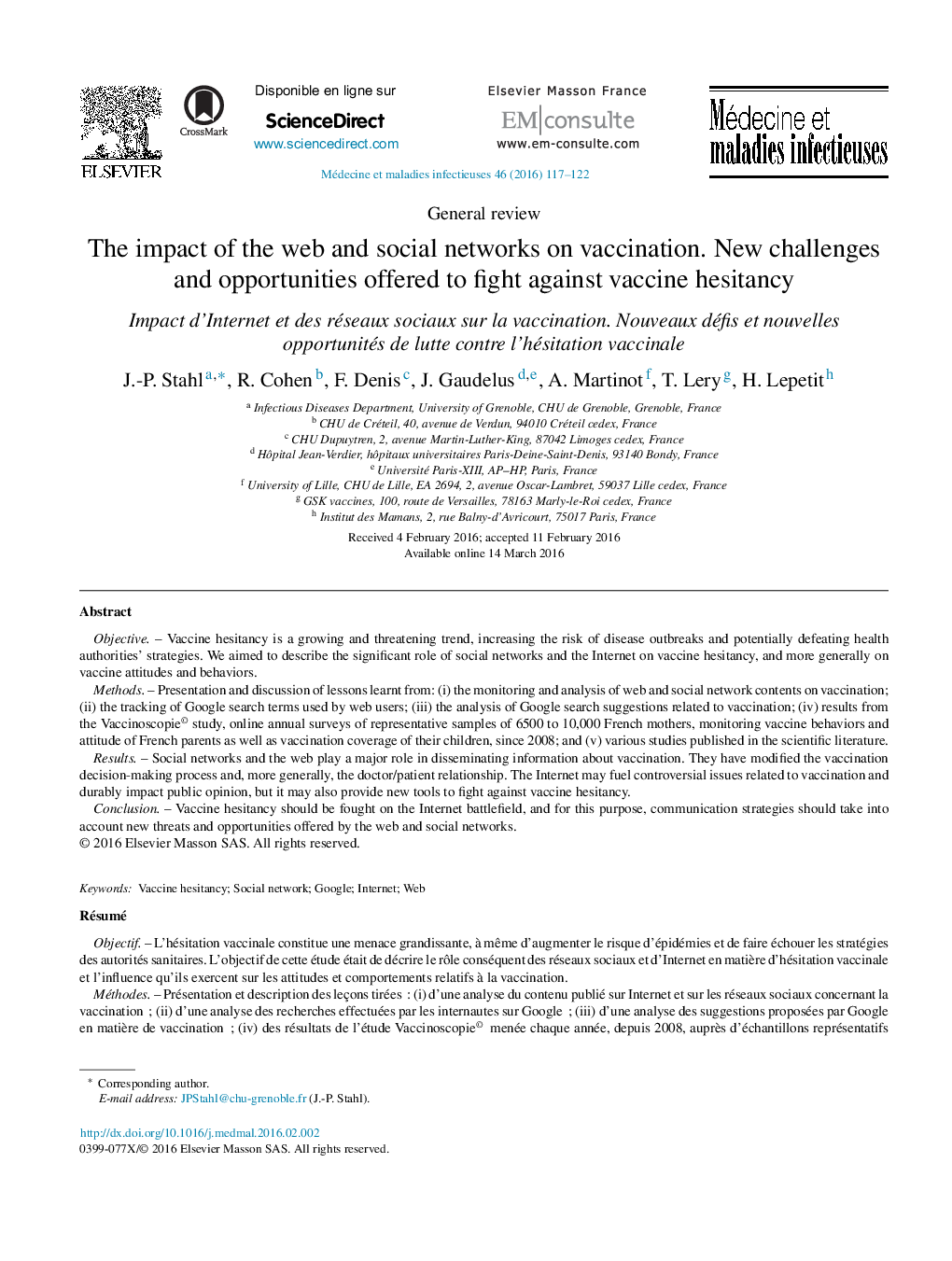| کد مقاله | کد نشریه | سال انتشار | مقاله انگلیسی | نسخه تمام متن |
|---|---|---|---|---|
| 3412256 | 1224218 | 2016 | 6 صفحه PDF | دانلود رایگان |
ObjectiveVaccine hesitancy is a growing and threatening trend, increasing the risk of disease outbreaks and potentially defeating health authorities’ strategies. We aimed to describe the significant role of social networks and the Internet on vaccine hesitancy, and more generally on vaccine attitudes and behaviors.MethodsPresentation and discussion of lessons learnt from: (i) the monitoring and analysis of web and social network contents on vaccination; (ii) the tracking of Google search terms used by web users; (iii) the analysis of Google search suggestions related to vaccination; (iv) results from the Vaccinoscopie© study, online annual surveys of representative samples of 6500 to 10,000 French mothers, monitoring vaccine behaviors and attitude of French parents as well as vaccination coverage of their children, since 2008; and (v) various studies published in the scientific literature.ResultsSocial networks and the web play a major role in disseminating information about vaccination. They have modified the vaccination decision-making process and, more generally, the doctor/patient relationship. The Internet may fuel controversial issues related to vaccination and durably impact public opinion, but it may also provide new tools to fight against vaccine hesitancy.ConclusionVaccine hesitancy should be fought on the Internet battlefield, and for this purpose, communication strategies should take into account new threats and opportunities offered by the web and social networks.
RésuméObjectifL’hésitation vaccinale constitue une menace grandissante, à même d’augmenter le risque d’épidémies et de faire échouer les stratégies des autorités sanitaires. L’objectif de cette étude était de décrire le rôle conséquent des réseaux sociaux et d’Internet en matière d’hésitation vaccinale et l’influence qu’ils exercent sur les attitudes et comportements relatifs à la vaccination.MéthodesPrésentation et description des leçons tirées : (i) d’une analyse du contenu publié sur Internet et sur les réseaux sociaux concernant la vaccination ; (ii) d’une analyse des recherches effectuées par les internautes sur Google ; (iii) d’une analyse des suggestions proposées par Google en matière de vaccination ; (iv) des résultats de l’étude Vaccinoscopie© menée chaque année, depuis 2008, auprès d’échantillons représentatifs de mères françaises (de 6500 à 10 000) dont l’objectif est de suivre les attitudes et comportements des parents français en matière de vaccination et d’évaluer les couvertures vaccinales des enfants ; et (v) de différentes études publiées sur le sujet.RésultatsLes réseaux sociaux et Internet jouent un rôle conséquent en matière de diffusion de l’information vaccinale et modifient le processus décisionnel relatif à la vaccination et, de manière plus générale, la relation médecin/patient. Internet peut parfois alimenter certaines polémiques vaccinales, influençant ainsi l’opinion publique. Cependant, Internet offre également de nouveaux outils de lutte contre l’hésitation vaccinale.ConclusionLa lutte contre l’hésitation vaccinale doit se jouer sur Internet. Les stratégies de communication en la matière doivent donc tenir compte des nouvelles menaces et opportunités offertes par Internet et par les réseaux sociaux.
Journal: Médecine et Maladies Infectieuses - Volume 46, Issue 3, May 2016, Pages 117–122
